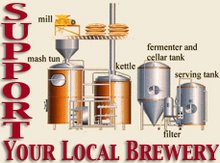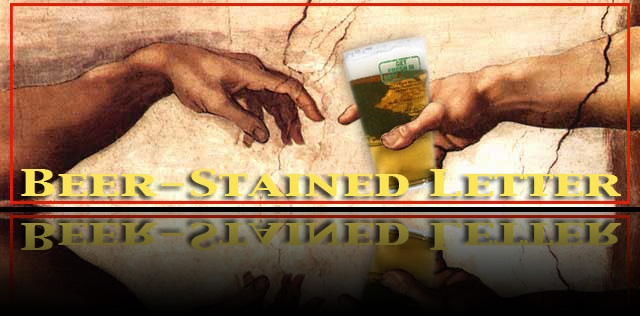Barristers, beer and a new book
 Add one more title to the bookshelf on New Jersey beer.
Add one more title to the bookshelf on New Jersey beer.
Mike Pellegrino, a lawyer in Denville and appreciator of better beer, is the author of Jersey Brew, The Story of Beer in New Jersey. Don't think of the 160-page book as an examination of current beer trends and the state's craft beer scene.
Besides beer, Mike is a fan of history, and his book is an intersection of the two. The Garden State craft beer scene is but a coda to the remembrance of all the labels once brewed in New Jersey, like Krueger (the nation's first canned beer), Ballantine Burton Ale (imagine some bar talk on Burton ale at a Garden State watering hole in 1985, and not in a historical context ... no way; it was unheard of again until the mid-1990s) and Camden Bock Beer. (There's 110 images of old labels in the book.)
The part of the book likely to prove most appealing to readers is the Garden State's colorful defiance of Prohibition (January 1920-December 1933), which New Jersey was dragged into kicking and screaming. The state rejected the temperance movement as it was visited upon state legislature after legislature, and only bowed after the 18th Amendment to the Constitution poured it down the state's throat like a bitter cocktail.
Mike says beer was openly sold in New Jersey during the Terrible 13, and federal agents who prevailed upon the illegal taps to enforce the law were hard-pressed to pressure those caught to rat out where the beer came from. Under Prohibition and a corresponding gangster era, there were even some innovative and sneaky ways to move beer around, such using fire hoses. (Sounds sort of like beer baron Homer Simpson and the booze-filled bowling balls sent to Moe's Tavern when Springfield went dry.)
Besides being a chronicler of New Jersey beer history, Mike's also an independent defender of the state's modern craft brewers. A recent op-ed piece he wrote for the New Jersey Law Journal examines the disparities between how the Garden State treats its vintners and brewers.
The Nov. 9 article in the journal, for which Mike is an occasional contributor, picks up on an oft-made point about post-Prohibition beer and wine, namely the greater freedoms wineries enjoy compared to brewers. That would include the sharp differences in the costs of brewing licenses vs. vintner licenses, and the state's almost inexplicable unbalanced approach to on-premise sales of beer and wine. The state blesses generous sales at the winery, while, as we know, craft brewers get handcuffed with the per diem limit of two sixpacks per person at the brewery tour gift shop.
Roll into that regulatory chasm the fact that wine can be sampled at packaged goods stores, but if you want to know what a beer tastes like before you buy, go to another state (or to the brewery on a tour day). It's not going to happen at the point of purchase here, much to the ire of brewers, who rather strongly believe that consumers who get to try will buy, not just their brands but any brand that can be sampled. (It's a rather sad irony, too, that part of the expressed mission for New Jersey's Alcoholic Beverage Control agency is to foster competition. Yet, something so simple as an in-store tasting of beer remains illogically and archaically verboten.)
To make such a widely observed point may seem like treading old ground. But for the craft brewing industry, the advantage of what Mike's article offers is the targeted audience of a professional journal that intersects with the people who make the rules. Understand that as: Some folks in Trenton may see it, read it and decide to correct the course and change the rules to be fairer, more business-friendly.
"If you didn't have ties to New Jersey, why would you open a microbrewery in New Jersey?" Mike says. It's easier, he notes, to set up shop in neighboring Pennsylvania or New York, where the rules aren't designed to stifle entering the game, while the New Jersey beer markets remain within reach.
"We set ground rules that make it clear, don't try it here," he says.
FURTHER READING:
You must subscribe to the Law Journal to read it online, so here's Mike's article in jpeg form (click to enlarge).












1 comment:
While it could be an editing problem with the Law Journal article (rather than the author's info), there are some basic errors concerning the breweries of NJ in it.
"Rheingold" (actually called "S. Liebmann & Sons" during that era) and Pabst were not NJ brewers "100 years ago". Pabst bought the former Hoffman brewery in Newark in 1945 and Liebmann didn't enter NJ until the early 1950's when they bought the former Trommer's brewery in Orange.
P. Ballantine & Sons closed in 1972, not "the 1960's". Also, Ballantine, for one, was not "too small to compete with A-B, Coors and Miller". They were a Top Ten brewer (as high as #3) for the first 25 years or so after Repeal and MUCH bigger than either Coors or Miller during that period. Indeed, for a time (after both A-B and Pabst moved to Newark) Ballantine was the bigger brewer in the country operating only a single brewery.
Post a Comment